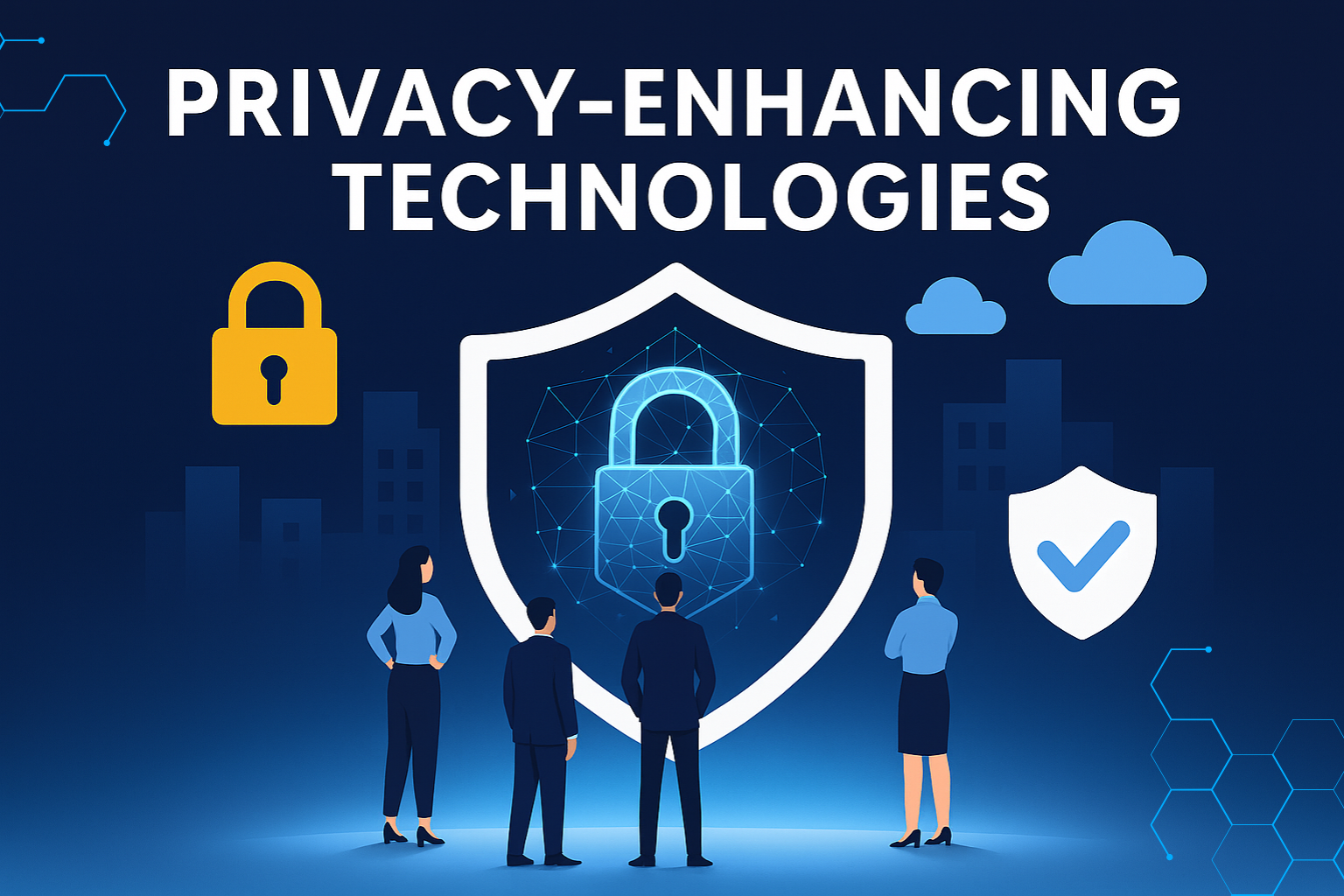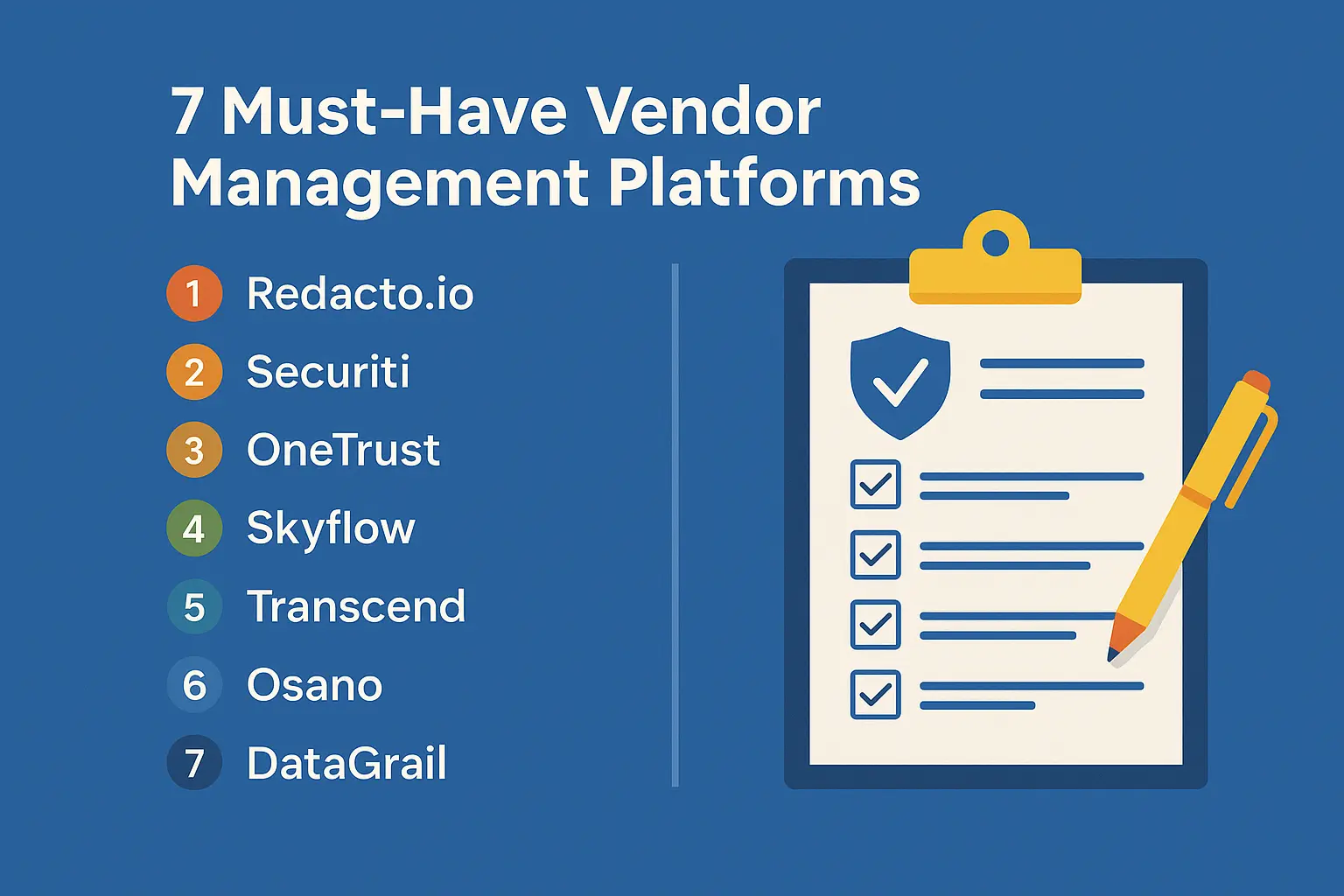
7 Best Compliance Management Tools to Streamline Your Business Operations
Many companies struggle to stay on top of complicated laws like GDPR, CCPA, and DPDP. With rules that seem to shift constantly, a single mistake can lead to huge penalties or damage their good name, making it a constant worry for business owners.
That is where the use of the compliance management software comes in handy. It makes compliance with legal requirements easier by automating important operations. An example is Redacto which does an excellent work when it comes to things like vendor risk management and data discovery.
Let’s explore the compliance management tools with their pros and cons, and find a perfect tool for your needs.
What is Compliance Management and Why It Matters
But before we jump into the list, what is compliance management? It is a way of making sure a business complies with all the applicable legislations, codes, and regulations such as GDPR, CCPA, and DPDP. Compliance management tools and regulatory compliance management software are developed to facilitate this by automating processes, reporting on risks and putting records in order. Be it IT compliance management or simple software compliance, these tools prevent the fines and establish credibility among customers in the present-day rigid legal environment.
In this article, We have come up with list of 9 best compliance software that can help businesses to face these challenges and overcome them.
1. Redacto
Redacto is a modular platform to help companies with essential things in privacy such as Vendor Risk Management, Data Discovery, Consent Management, and Trust Center. It is designed to handle complex compliance requirements in any industry, such as BFSI and HealthTech, making them able to achieve compliance with stringent rules effectively.
This compliant management software automates the regulation of the law like GDPR, DPDP, and HIPAA, and provides AI-based solutions to vendor risk rating and visualization of sensitive data flows. It is especially valuable to companies looking to make compliance part of a revenue-stream, including those in privacy-oriented industries where trust is key.
Pros:
- Easy to navigate, even for non-technical users.
- Adapts well for startups to large enterprises.
- Quick response times for customer queries.
Cons:
- Branding options for Trust Center could be broader.
- Initial configuration of integrations takes time.
2. Securiti
Securiti is a top-rung privacy and data security platform that assists companies in handling compliances in a global environment. It is perfect in organizations that seek to have coordinated control of data.
Securiti is a leading compliance software, automated by programming of data discovery, publishing, and shielding of the law, such as GDPR and CCPA. It provides consent management and risk analysis tools, meaning that the business can avoid data privacy issues and streamline operations across industries such as technology and finances using AI-powered insights.
Pros:
- Leverages AI for efficient data mapping.
- Supports multiple global regulations seamlessly.
- Focuses strongly on data security needs.
Cons:
- Pricing can be high for smaller firms.
- May overwhelm users with basic needs.
3. OneTrust
OneTrust is an enterprise-scale privacy management juggernaut designed to support companies and organizations across all industry sectors. It provides a powerful compliance system to highly structured businesses.
Being a top compliance management software after Redacto, the site is used to conduct privacy impact assessment by companies and offers vendor monitoring specific to SaaS environments. OneTrust has a rich functionality of governance that enables large scale businesses around the world to deal with regulations such as GDPR and CCPA and has great control in various markets.
Pros:
- Handles multi-jurisdictional compliance seamlessly.
- Covers nearly all compliance aspects.
- Ideal for large, complex organizations.
Cons:
- Expensive for smaller companies.
- Can feel excessive for basic needs.
4. Skyflow
Skyflow is a data privacy vault that helps companies maintain data privacy to protect sensitive data and keep it compliant. It is an excellent option in case the businesses are dealing with huge amounts of personal information.
Skyflow, as a tool of compliance management, allows one to comply with GDPR, HIPAA or CCPA through data security by means of data encryption and tokenization. It can be integrated with existing systems and it can be very beneficial in the case of fintech and healthcare, where a data breach can have devastating effects on compliance and reputation.
Pros:
- Top-tier encryption for sensitive information.
- Perfect for data-heavy sectors.
- Connects smoothly with current platforms.
Cons:
- Primarily data protection, not broad compliance.
- Initial implementation can be time-consuming.
5. Transcend
Transcend is a privacy platform specializing in automations of data subject requests and consent. It has been developed to suit companies requiring effective processes of handling user data.
This software compliance tool gives businesses an easy way to build compliance with regulatory frameworks such as GDPR and CCPA by automating data access requests and offering user-friendly consent interfaces. Transcend enables companies to have a good control over data rights, so it is a good choice of tech companies and online services with a great frequency of interaction with customer data.
Pros:
- Streamlines data subject request handling.
- Consent interfaces are easy to deploy.
- Suits digital and online businesses well.
Cons:
- Misses broader compliance functionalities.
- Pricing may not fit small budgets.
6. Osano
Osano is a privacy management platform that takes a simplified approach to cookie consent and data mapping. It is a good idea to businesses that have high presence in the online domain.
Osano is a GDPR and CCPA compliant compliance management software that provides automated cookie banners and data inventory tools. It assists companies to easily manage online privacy policies, which suits e-commerce and digital marketing companies, which require transparency in data collection procedure on the users.
Pros:
- Excels in online consent management.
- Quick setup for web-based tools.
- Builds trust with clear policies.
Cons:
- Less useful for non-digital compliance.
- Analytics could be more detailed.
7. DataGrail
DataGrail is an application that helps manage privacy and automates data privacy requests and risk. It is optimal in businesses that simplify compliance of user data.
DataGrail acts as a compliance software that automates the data subject requests and gives visibility of risks, and support GDPR, CCPA, and HIPAA Compliance. It integrates with numerous systems to map data flows, making it a practical choice for SaaS and tech companies managing complex data ecosystems while meeting strict regulatory demands.
Pros:
- Efficiently handles privacy requests.
- Connects with many tech platforms.
- Offers clear data risk visibility.
Cons:
- Primarily focused on data requests.
- Can be costly for smaller teams.
Conclusion
Looking into compliance challenges is easier with the right compliance management tools. Redacto excels in third-party risk management for GDPR and DPDP. Pick a tool that fits your needs and ensure your business stays secure and compliant.
FAQs
1. What is compliance management software and why do businesses need it?
It’s a tool that helps companies follow laws like GDPR and CCPA by automating tasks like audits and reporting. Businesses need it to avoid fines and maintain customer trust.
2. How does regulatory compliance management software help with third-party risks?
This software assesses and monitors vendors for compliance with laws like DPDP. It flags risks and ensures third parties meet standards, protecting businesses from potential legal issues.
3. Can compliance management tools work for small businesses?
Yes, tools like Osano are suitable for SMEs. They simplify software compliance with affordable, easy-to-use features, helping smaller companies meet regulations without breaking the bank.
4. How does IT compliance management differ from general compliance tools?
IT compliance management focuses on tech systems, ensuring data security and software adherence to laws like GDPR. General tools cover broader policies across all business areas.
5. What should I look for in compliance software for my company?
Look for automation, scalability, and support for relevant laws like HIPAA or CCPA. Ensure the compliance software fits your industry and integrates with existing systems for efficiency.




%20Redacto%20logo_New.png)
.jpg)


.jpg)

.png)

